
Gladioli are beautiful, vibrant and easy-care flowers. But everyone who has such a plant needs to know when to dig out gladioli and how to store them. The time for digging will depend mainly on when the flowers of the plant ripen and when they were cut. And this is already individual for each variety.
Content
When to dig out gladioli in the fall
Corms ripening takes place 30 days after the beginning of flowering. Sometimes this process can take up to 40 days. If you cut the flower of gladiolus after flowering in early August, then in the first half of September you can dig out the bulb. Gladiolus will delight you next year, but this requires the whole procedure, cleaning and storage of bulbs. People who have many gladioli and all of them of different varieties can get confused in the time of flowering and the ripening time of corms.
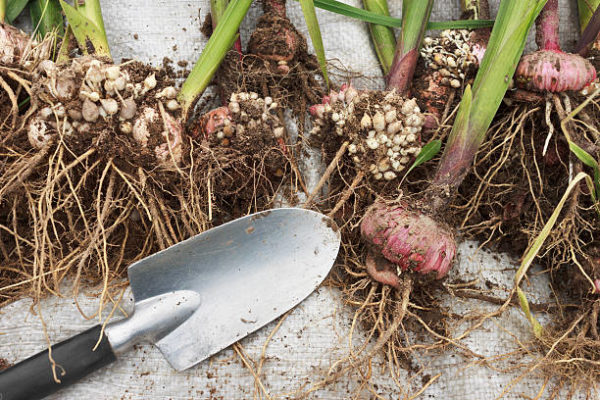
How to dig out gladioli
On the territory of Russia, in non-chernozem zones, some varieties of this plant will bloom only by the end of August. And many are wondering when to dig out gladioli? I focus on mid-August, it is necessary to dig in mid-September. If the corm is not fully ripe, then there is nothing to worry about. On the contrary, it simplifies the process of digging.
Children who are not ripe on the corms will not be separated; they can be easily taken from the ground along with the main bulb. They will have a gray tint. This color indicates that they are immature. In another case, they would have a dark brown shade that is similar to the shade of the soil itself. If you dig up the ripened corms, then the likelihood that most of the baby will be lost is great. Digging is best done using scoops with tough and reliable handles.
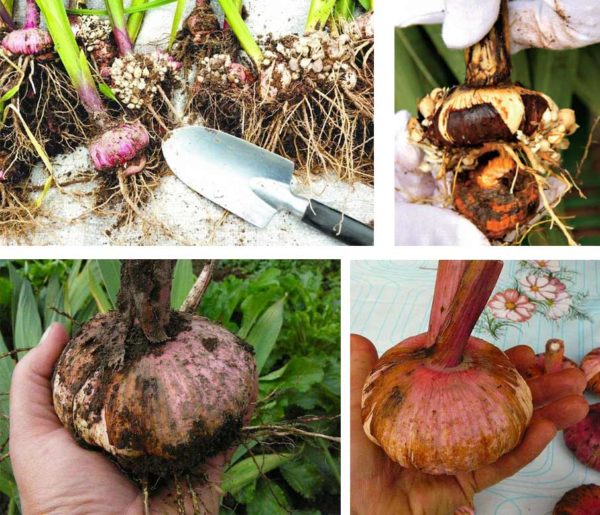
What is the preferred weather for cleaning
Is it possible to understand when to dig out gladioli in the fall, guided by the weather? Yes, the weather factor is important. The weather should be sunny. It is necessary that the earth is not very wet, so that the soil is easily separated from the corms and does not damage either her or her children.
Cleaning tips
Before you learn how to store gladioli in the winter at home, you need to learn more about the cleaning process. First of all, those gladioli that were grown from corms are chosen. It is also preferable to first dig up early varieties and those that have a dark color (red, cherry, violet). To easily identify these groups of gladioli, they are initially planted nearby, sorted by variety. Later varieties are planted separately.
Digging
If gladioli were planted with a single-line transverse method, then dig them out like this:
- about 6 centimeters are measured from the center of the bulb. On both sides of it, work tools (scoops) are inserted into the kidney.
- you need to start from the edge of the first row. Immerse the scoops of the earth no more than 15 cm. Handles divert away from the plant.
- applying a little pressure on the handles, scoops along with the soil reach the surface of the gladiolus bulbs.
- each corm is peeled (the children save) and deposited in a container (preferably a basin or sieve).
Bulb treatment after digging
After digging, it is necessary to carry out the processing process. First of all, the bulbs are washed, the stalks of the corms are removed, cutting them closer to the base. Old corms are carefully separated by hand, the roots are cut off. If the old onion does not separate well, then it should be dried first.

After the washing process, the circumcision must be allocated at least three weeks for drying. The maximum temperature should be no more than 30 ° C, and the minimum 25. For another month, the corms are dried at room temperature. It is better to dry the bulbs a little rather than leave them moist and ruin the planting material.
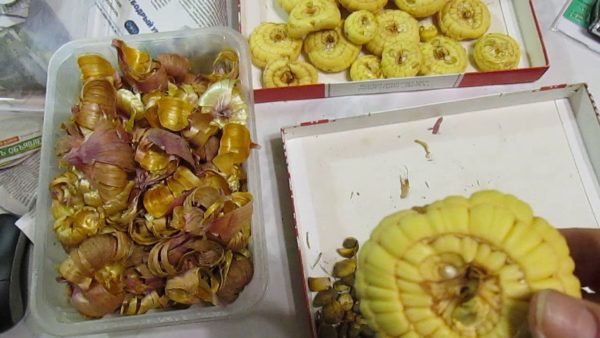
Methods of storing planting material in the winter at home
If you have ready-made well-dried planting stock, then you need to learn how to properly store gladioli bulbs at home for the winter. Before laying the material, it is re-inspected and sorted. For inspection, it is necessary to remove the upper scales from the bulb to make sure that the bulb is not damaged and dried.
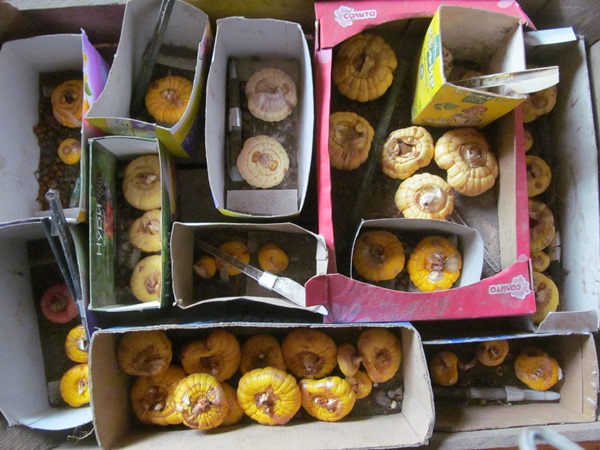
Options:
- in the cellar. This is a good option, provided that your cellar is dry and it is really possible to maintain a good temperature for storing planting material in it. And this, the maximum is 10 degrees Celsius and the minimum is 3.
- in the basement. Also an option! The conditions should be the same as in the cellar. Have a good look at your basement for moisture, mold, make sure that the temperature in it is suitable for storage. It is important that the onion bags are folded into boxes that have openings for improved ventilation.
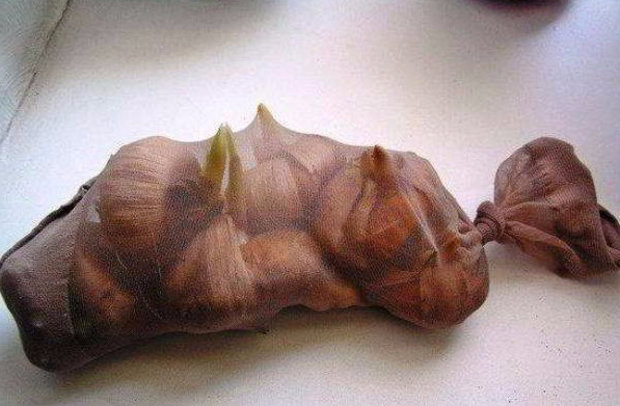
- Think about how to store gladioli at home if you don’t have a basement or cellar. This is an urgent issue for many urban residents. It’s not worth it to be upset. Storage can be carried out in the refrigerator. It is important to consider that in the refrigerator near the roots too long roots may form that will not bring any benefit to the plant.
- it is difficult to store bulbs in an apartment in winter, because in such conditions it is difficult to maintain the low temperature required by planting material. But difficult, does not mean that it is unrealistic. Storage at room temperature can be successful if small corms are wrapped in newspaper or paper so that they do not dry out. Large ones need to be constantly examined for rot. If rot has been noticed, then the bulb will have to be thrown away. If the bulbs are damp, they are re-dried.
- storing gladioli in winter at home will not be a problem for you if you have a balcony. In areas with mild winters, boxes with bulbs can be laid directly on the floor of the balcony, but at the same time it should be without drafts. It is advisable to wrap the bulbs at the first frost. If the winters are harsh, you will have to work hard to make a container with insulated walls for planting material. For insulation, foam is used. And even in this case, the temperature in the boxes must be constantly checked.As you can see, learning how to save gladioli in winter at home is easy.
Plant material disinfection
Pest infestation of bulbs is not uncommon. If you are interested in how to store gladiolus bulbs, then be sure to find out about the process of eliminating pests. Insects can survive the winter by climbing under the scales of the bulbs. To make sure your planting material is protected from pests, you need to process it with a drug like Inta-Vir, for example. He is bred in water. In the solution, the bulbs must be soaked for half an hour, after which they are carefully dried.
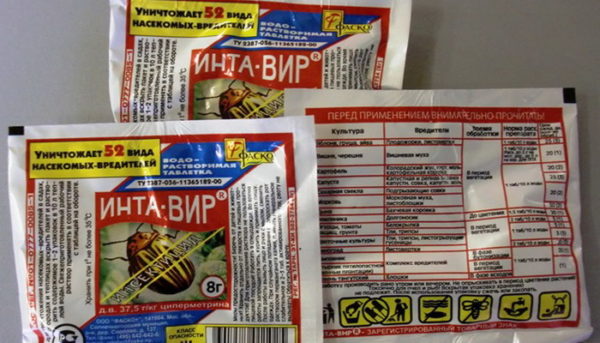
If a good preparation is difficult to find, then treatment can be carried out with hot water, in which the bulbs leave for 10 minutes. Many gardeners are convinced that even ordinary powder for bullying cockroaches can help with the elimination of gladiolus pests.
Reviews
Helena:
“It turned out to save the bulbs only this year. In the past, lost a lot of planting material due to damp in the basement. This year, she armed herself with all the necessary information and tried to prevent mistakes. The result was pleased. "
Victor:
“Every year, with his wife, we plant bulbs on the balcony for the winter. Many people wonder how we manage to save so much planting material. And we got used to it and even the cold winters are not afraid of us. We know how to save corms and how to provide them with good conditions. ”
Yulia:
“For the first time I have grown so many gladioli and now I’m thinking of making a good bookmark for the winter. I have not yet chosen a method, but friends recommend keeping planting material in the basement. They’re so injured every year, and there’s no problem. ”
Maria:
“For the third year now I leave the bulbs for the winter in my basement. The basement, of course, is not perfect. Many times they tried to eliminate dampness. Nevertheless, almost all of the planting material survives by spring. During the winter, I get rid of only part of the bulbs, which inevitably begin to rot. But this doesn’t affect the total quantity. ”

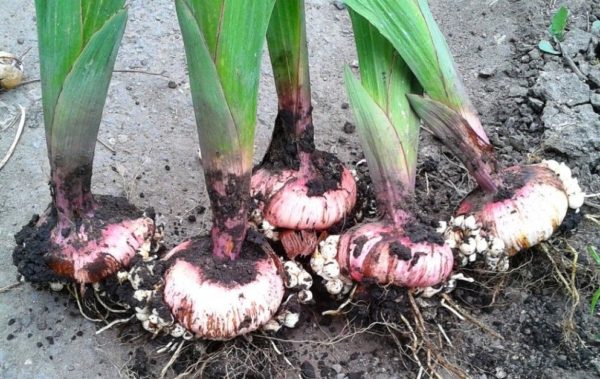
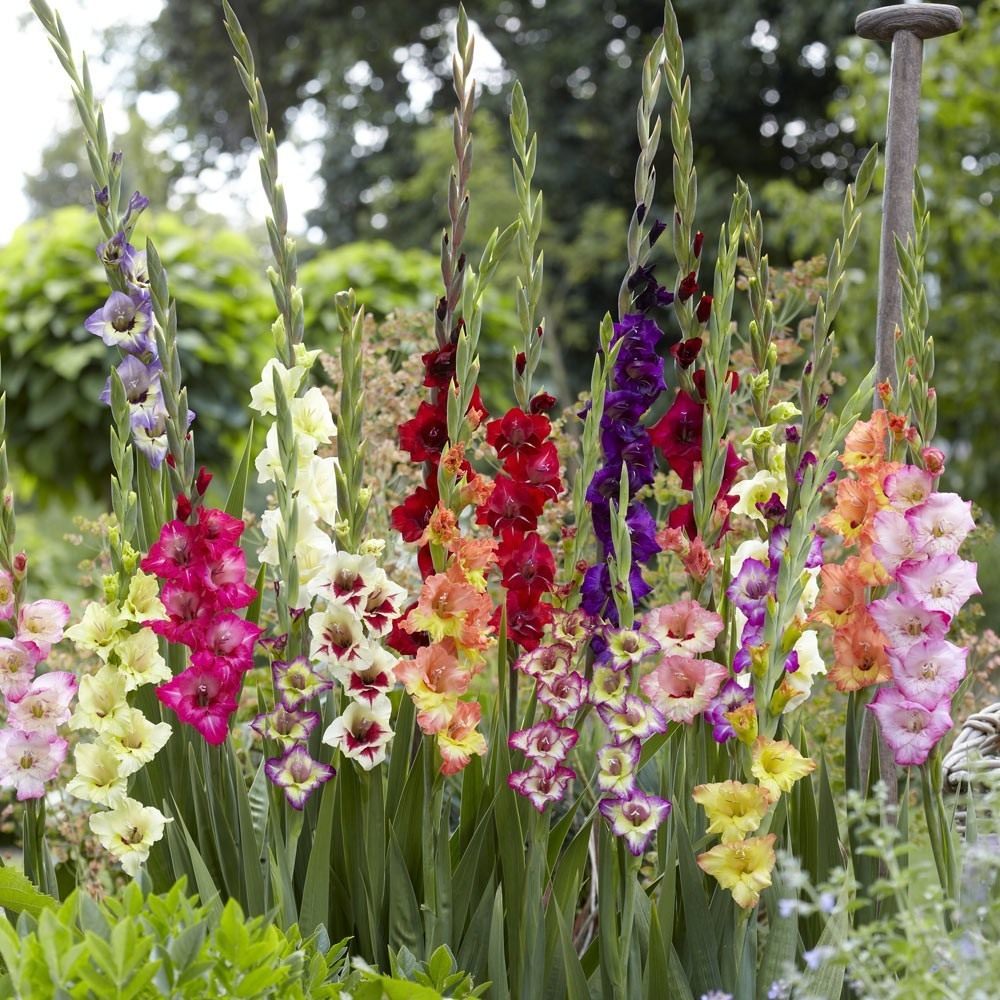
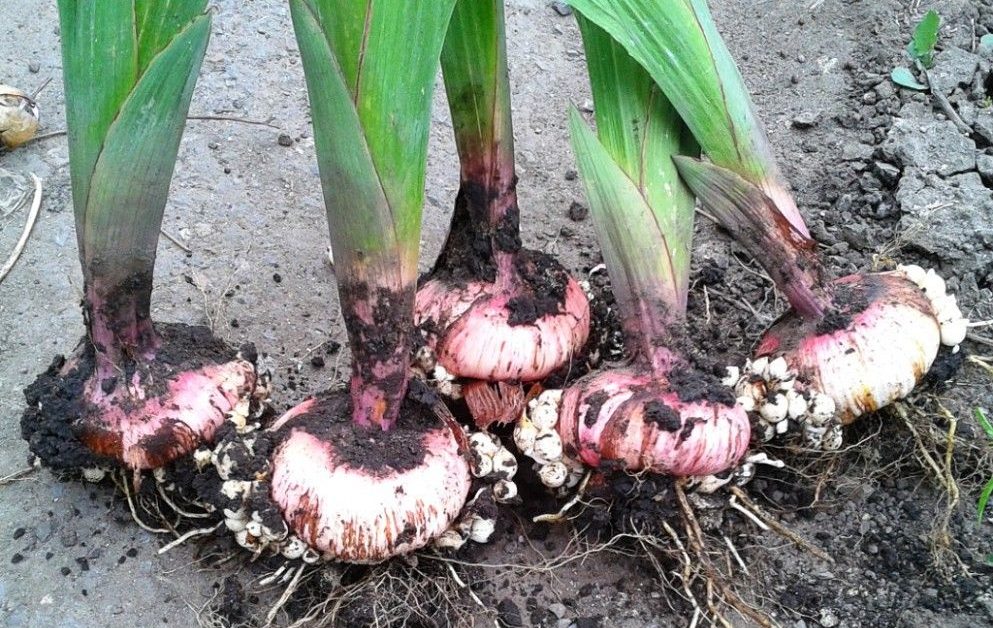
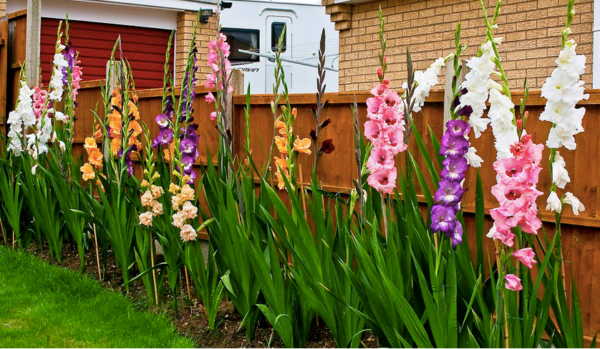
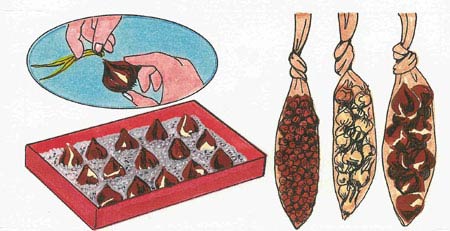
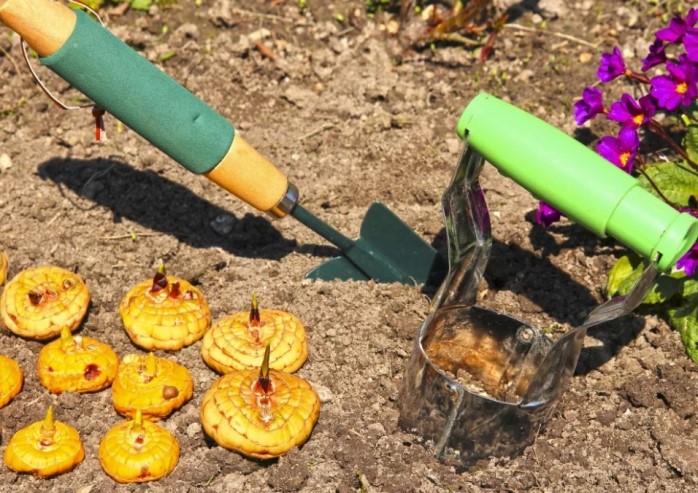 When and how to plant gladioli in spring in open ground
When and how to plant gladioli in spring in open ground How to deal with thrips on gladioli
How to deal with thrips on gladioli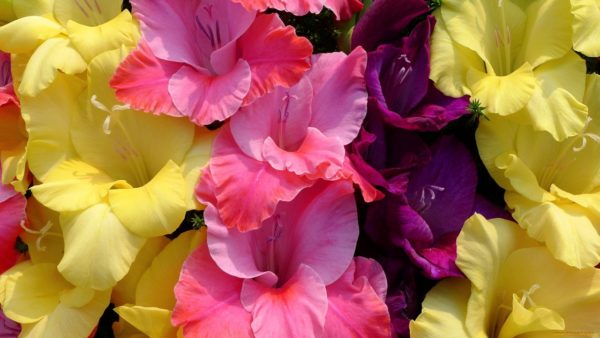 Gladioli: landing and care in the open ground
Gladioli: landing and care in the open ground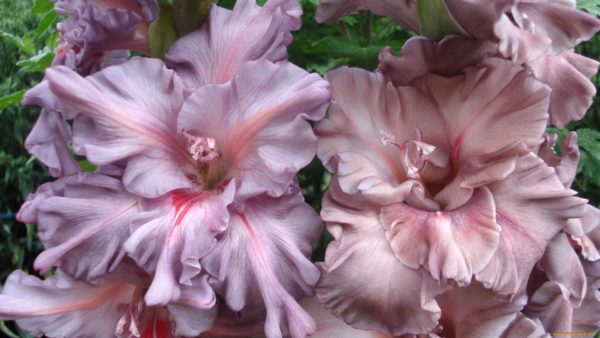 Children of gladioli: what to do with them
Children of gladioli: what to do with them